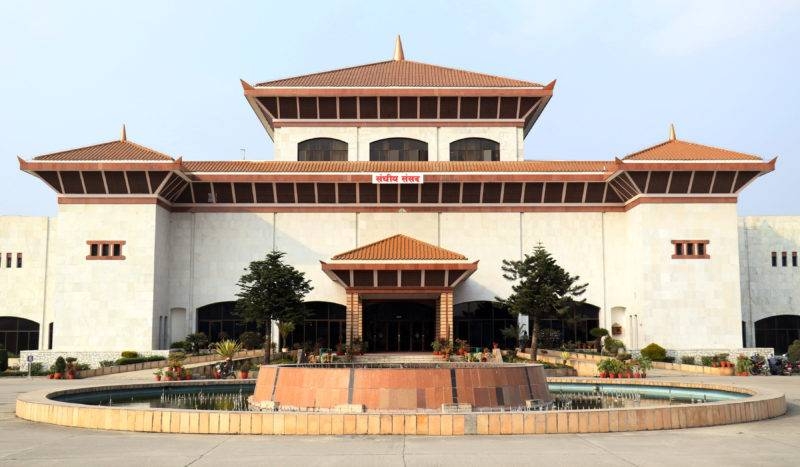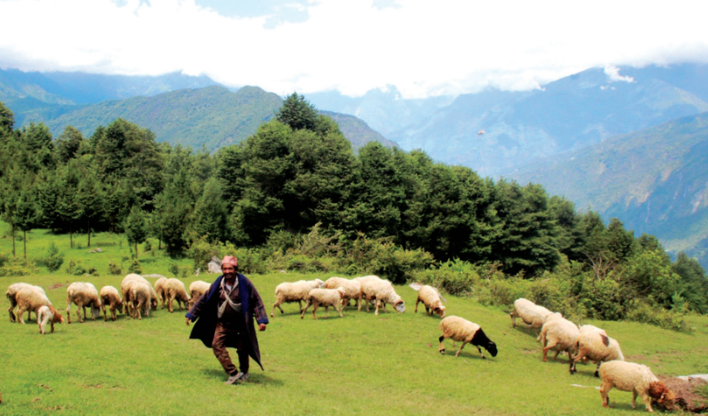Let Sri Swasthani bless us all
Today, Nepal is not only home to adherents of different religions; many Nepalis are atheist too. Even in old times, Nepal was diverse in terms of aspects like faith. In those days also, Nepal was constantly transforming, albeit slowly and naturally. In recent times, though, the demographics are changing quite fast, as a result of scientific outlook, down-to-earth materialistic social and economic relationships and our admiration of and submission to alien religions, cultures and languages, among others. Changes are so pervasive that it is sometimes very difficult to distinguish the new from the old. Historians agree that Nepal was once a confluence of two major streams of humanity–the Indo-Aryans and the Tibeto-Burmans—along with some other indigenous or roaming populations acting as contributaries. Over time, genetic mix-ups occurred also with other groups, along with new human-nature interactions in different ecological regions. Because of these mix-ups, communities considered to be of the Mongolian stock do not look exactly the same. Ditto with the Aryans from the hills and the southern plains. The Kumain Brahmins and the Purviya Brahmins have dissimilarities, too. While the two groups of Brahmins are considered to be the descendants of the same Rishis, sing the same Veda hymns, their rituals are not an exact copy of each other. While Nepal and North India have some common cultural and religious heritages, there are distinct practices that are unique to Nepal. Swasthani Bratakatha is one among them. The Sri Swasthani Bratakatha is a sacred scripture, a mini-purana if you will, where Kumara, the eldest son of Lord Shiva and Goddess Parvati, tells the story to the great sage Agastya. Kumara is another name for Skanda the great warrior, after whom there is the Skanda Purana, one of the 18 Puranas, part of the sacred literature of the Sanatan Dharma, of which Hinduism forms a part. The scripture mentions itself as part of Magha glories (Magha Mahima, the glory of the month of Magha) in the Kedarakhanda chapter of the Skanda Purana. Sri Swasthani is the local deity representing Goddess Parvati herself, addressed in the book as Sri Swasthani Mata (Mother Sri Swasthani). Vrata is a sort of religious penance, characterized by abstinence from some or all of the indulgence in food, water, sexual activity, arguments, speech, sleep, and desire. Katha means a story, here depicting the glory of Sri Swasthani. As with the Puranas and the Mahatmyas, the Swasthani devotees maintain bodily cleanliness, take minimal amounts of food considered pious, recite the Sri Swasthani Bratakatha and worship the Goddess Sri Swasthani for a month starting from the full moon called Swasthani Purnima. While one person reads out the story in the family, other people around the reader listen to the glory attentively and offer flowers, fruits, and holy water to Goddess Sri Swasthani. Devotees also flock to the Shali river in Sankhu for performing ablution and other rigorous rituals. A little bit about the nature of the Puranas, Mahatmyas and the Stotras (prayers), which are part of the ancient Sanskrit literature. Each of them sings the glory of the concerned deity, practice or tradition. The Ramayana upholds Lord Rama as the highest personality of the Godhead, Durga Saptashati sings the glory of Goddess Durga the Almighty Mother, and so on. While Brahma the Creator, Vishnu the Protector and Shiva the Destroyer are considered the Trinity, the Hindu scriptures list 10 major incarnations (including the Kalki, who, supposedly, is yet to be born) of God. The concept becomes more complicated with each reincarnation having multiple names. Vishnu alone has one thousand formal names, for example. Then each Bhakt (devotee) can give the Lord one or many names. Foes also give their choicest names to their ‘disliked’ Godhead. While showing a dislike for the Godhead in public, they may have high regards for the Godhead and even worship the latter in secret. This much about those deities, for now. In Nepali households, the recital of Shri Swasthani Vrata Katha by following prescribed rituals is believed to bring good luck, good health and prosperity in the family. Let Goddess Swasthani bless this one big family – the whole of Nepal.
Shanta Majhi: A taxi driver’s tale
Sixty-year-old Shanta Majhi, who lives in Samakhusi, Kathmandu, has been working as a taxi driver for the past 27 years. It’s a tiresome and thankless job, he says, but he has persevered because he wants to provide his children the things he never had: parental guidance and a good education. “I have had to struggle for survival since I was nine-years-old,” says Majhi, who was born and raised in Ramechhap, in the Bagmati Province of Nepal. Despite being an only child, he says he had to take care of himself, and going to school was never an option. He had to manage his own expenses, and he worked as a househelp for one of the families in his hometown. “I didn’t have anyone to guide me or show any forms of love or affection,” he says, “I always felt my parents’ absence.” Majhi mentions that although he was fed and had a roof over his head, he was never treated well. “They called me demeaning names, and always behaved badly,” he adds. It wasn’t the kind of life he had hoped for. So Majhi left for Kathmandu, the city of dreams of many people in his hometown, at the age of 21. But life in Kathmandu wasn’t very different from life back home. Finding a decent job turned out to be almost impossible. Fortunately, Majhi landed a job as a mechanic. Next on his wish list was to save enough to be able to start a family. “I dreamt of getting married someday, and having my children run around the house,” he says. It was his way of creating the family he never had as a child. He worked relentlessly for eight years before getting married at the age of 29. His wife worked as a maid. She still does. Majhi laments he hasn’t been able to give her a comfortable life. After 12 years of working as a mechanic, he was finally able to save enough to buy his own taxi. He hoped starting his own business, however small, would enable him to give his family all the things they wanted. By then, Majhi and his wife had had two daughters and a son. “I wanted them to get a good education, which I never got,” he says. Driven by that need, he sent his children abroad for higher education. One of his daughters is now a nurse in Australia, while the other is studying in Malda in West Bengal, India. His son is majoring in graphic designing in Australia. But all this came at a cost. Majhi took out huge loans and is now buried in debt. Although he firmly believes he made the right decision, the amount of money he needs to pay back keeps him up at night. Paying off their loans would be much easier if there weren’t extra expenses they had to take care of, says Majhi. With 15 hours on the road every day, the taxi needs regular repair. The rough, bumpy roads of Kathmandu coupled with the occasional damage by reckless bikers means he has to shell out quite a bit of money to keep his vehicle in a good condition. “Fuel is so costly that it’s hard to make a profit,” he says. The couple’s financial condition worsened during the Covid-19 pandemic. Both of them had to depend on whatever little savings they had, with no job whatsoever during the lockdown. “We relied on the ration distributions and help from some organizations for our daily meal,” he says. Then there are also his health issues that require frequent hospital visits. Majhi is on medication for high blood pressure and liver problems. Since he works for more than half a day, he is also unable to follow a good diet. On top of that, he suffers from anxiety and depression as a result of his traumatic childhood but he confesses he doesn’t want to take medication for it. He says he has lived most of his life in denial about his mental health issues. “At first, I didn’t know what any of those terms meant. I didn’t want to believe those problems even existed,” he says. But now, even when he knows he needs help, he says he doesn’t have the money to go visit a doctor or see a therapist. “People say health should be everyone’s priority but when you are poor, you don’t have that luxury,” he adds. His wife too struggles with anxiety and myalgia. But they need to decide which of their issues is worth spending money on. Often, one is overlooked in favor of another. “Our eldest daughter helps us out financially in times of need. But in this economy, I want her to think of herself first and not spend all her money on us,” he says. Despite having had a difficult life, he has only one regret. Majhi was so consumed with building a life for his children that he never got to give time for himself. “I had dreams too, which never got fulfilled,” he says. He wanted to build a house for himself in his hometown, Ramechhap, but with the debt he already has, he is now skeptical if he will ever get to live in his own house. Right now, he and his wife live in a rented room for which they have to shell out Rs 6,000 every month. He sometimes wonders how his life would have turned out had his parents not passed away when he was young. He thinks that maybe he could have gotten a degree, and his life would have been completely different. “But there is no point dwelling on it,” he adds. Nevertheless, he feels extremely proud when he thinks about his children. He is filled with a sense of accomplishment. “When I see them happy and doing well in life, I feel like all our struggles have paid off,” he says.
Designing bathrooms to prevent nasty accidents
Forty-one-year-old Rashmi Karki, who works for an NGO, lost her grandfather six months ago. He slipped and fell in the bathroom at their home in Kalanki, Kathmandu. He was 85. “My brother found him unconscious in the bathroom. We rushed him to hospital where the doctors declared him dead. They said he had suffered a head injury,” says Karki. Karki’s family had meant to ‘age-proof’ the bathroom. A relative had fractured her leg, after slipping in the shower, and Karki’s family was concerned about their safety as well. They were planning to install some handrails along the wall to hold on to, as well as buy some grip mats for the shower area. According to a report by the World Health Organization, fall is the leading cause of morbidity and the second biggest cause of unintentional injury-related mortality globally. Every year, 172 million people are injured, leading to short- and long-term disabilities, and 646,000 people die from fall-related injuries. Almost 80 percent of fall-related deaths and disabilities occur in low- and middle-income countries. A study by Nepal Surgeons Overseas Assessment of Surgical Need (SOSAS) has estimated that there are 16,600 deaths annually due to falls in Nepal. The study also found that fall injuries are the most common type of injury in Nepali people, accounting for 37.5 percent of all accidents. The risk of falling increases with age, says Dr Santosh Bhusal, medical officer at Civil Service Hospital in Minbhawan, Kathmandu. It could be because of poor eyesight, side effects of medicines that cause drowsiness, or the body becoming weak due to various underlying medical conditions. Bathroom falls are more common as tiles become slippery when wet. This past October, CPN-UML leader Balkrishna Dhungel died after falling in the bathroom of his residence in Gothatar, Kathmandu. Fatal injuries aside, falling in bathrooms often lead to hip joint dislocation and other compound fractures that take a long time to heal, especially in elderly people, says Dr Bhusal. Prakash Duggar, CEO, Kajaria Tiles Nepal, says safety should be the priority when designing bathrooms. Earlier, people opted for glossy tiles for their shiny and smooth finish. These days, matt tiles are preferred for their anti-skid properties. “Wholesalers and designers should also make their customers and clients aware about the kind of materials that should be used in bathrooms,” he says. He also suggests installing grab bars near commodes and in the bath. These are basically just steel rods, pretty much like a towel rack but stronger, that you can hold on to while getting up. Bars bolted to the walls are better than suction cup bars that can easily shift or get dislodged. They should also have a slip-resistant surface rather than a glossy finish. This, Duggar says, can significantly reduce the number of falls in elderly people as most bathroom accidents happen in the shower or while trying to get up from the commode. Most people ApEx spoke to said they were aware of the risks of bathroom accidents. They said they often told their grandparents, parents, or children to be careful. But accidents might happen despite being cautious. Duggar insists on matt tiles that aren’t slippery even when laced with soap or shampoo. You can apparently even install these in an old bathroom, on top of the flooring already there. At Kajaria, they have a tile option that can go on top of tiles, marble, or granite. “Your bathroom won’t have to be torn down and redesigned, if that’s what you fear,” says Duggar, adding most traders these days recommend matt tiles over glossy ones but there are plenty of sellers who don’t bother informing their customers. Kunal Thapa, director of Yarpa Traders, says a lot of focus goes on designing aesthetically pleasing bathrooms. But there are plenty of ways to make it safe without compromising on the looks. “I believe it’s the construction companies’ and material suppliers’ duty to make people aware about how their bathrooms should be designed to prevent accidents,” he says. Besides that, there are many simple ways to minimize the risk of slips and falls in bathrooms. One could be fixing a shower chair with non-slip rubber tips on the legs. Thapa suggests considering the lighting as well. Sometimes, accidents happen because of poor visibility. Karki, on the other hand, prefers a walk-in bath to a traditional tub that you have to climb over to get into. She says her family has also taken to storing essential items within easy reach to avoid falling while stretching or bending for the shampoo or loofah. “There’s nothing worse than losing a loved one or seeing them suffer because you failed to take simple precautions,” says Karki.
Prachanda majority for PM Dahal
With generous support from political parties and individual lawmakers across the board, a nascent ruling coalition under Pushpa Kamal Dahal won a crucial vote of confidence in the House of Representatives with an unprecedented majority, securing 268 votes in the 275-strong parliament that had 270 members present on the important day. Paradoxically, the victory in the parliament with a fractured mandate appears to have unseated the 78-member-strong CPN (UML) from its position of the kingmaker, with the largest party, the Nepali Congress, throwing its weight behind the coalition under the CPN (Maoist Center), which has 32 members in the parliament. Out of 89 NC lawmakers, 85 voted for the coalition, while one NC member could not vote as he had a court case pending against him. Lawmakers Kishor Singh Rathaur, Manoram Sherchan and Ambika Basnet were absent. Pashupati Shumsher Rana JBR, lawmaker from the Rastriya Prajatantra Party, could not vote as he was chairing the session. The NC supporting the ruling coalition means the bargaining power of the Maoist party will increase and Dahal will no longer be at the mercy of the second largest party in the parliament to remain in power. This lifeline will be crucial for Dahal and co if the UML-Maoist alliance comes under strain and headwinds begin to blow, especially after 2.5 years, the Constitution-set embargo for a change of guard. In such a case, if push comes to shove, Dahal will have a lifeline ready. Anyway, with Rastriya Swatantra Party (20 seats), Rastriya Prajatantra Party (14), Janata Samajvadi Party (12), CPN-Unified Socialist (10), Janamat Party (10), Loktantrik Samajvadi Party (4), Nagarik Unmukti Party (3) and five independents, a good number of political equations are possible even if Nepal Workers’ and Peasants’ Party and Rastriya Janamorcha—one seat each—choose to remain firmly in the opposition. After the euphoria over this victory is over, the Dahal-led government would do well to look back a little bit. Let’s just cite a few examples from Nepal’s contemporary history. In 2018, the KP Oli-led ruling coalition had a two-third majority in the parliament. However, it came crashing down barely three years later, thanks mainly to rifts within. In the 90’s, the NC got majority to form the government twice. But these governments became castles in the wind with the party riven by internal feuds. In the general election held after the establishment of a multiparty democratic polity in 1958, the BP Koirala government (NC) garnered a two-third majority in the parliament. But the government did not last long. Feuds within the party had a role in this collapse, apart from the then monarch’s ambitions. None of the majority governments formed in a space of six decades or so have survived full term. In such a context, the Dahal government would do well to tread with caution.



















